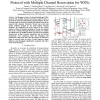Free Online Productivity Tools
i2Speak
i2Symbol
i2OCR
iTex2Img
iWeb2Print
iWeb2Shot
i2Type
iPdf2Split
iPdf2Merge
i2Bopomofo
i2Arabic
i2Style
i2Image
i2PDF
iLatex2Rtf
Sci2ools
127
click to vote
ICPADS
2010
IEEE
2010
IEEE
M-cube: A Duty Cycle Based Multi-channel MAC Protocol with Multiple Channel Reservation for WSNs
In this paper, a duty cycle based multi-channel MAC protocol with multiple channel reservation, called M-cube, is proposed to tackle the triple hidden terminal problems. M-cube can make nodes to choose one actually idle channel from all the expected idle channels. Therefore, M-cube can avoid data packet collisions resulted by the triple hidden terminal problems. By minimizing the lower bound of the average number of times of channel switching in M-cube, the optimal duty cycle is obtained through theoretical analysis. To validate the effectiveness of multiple channel reservation and dynamic optimal duty cycling, extensive simulations and real testbed experiments were conducted. Both the simulation and experiment results show that when the number of channels is large or network loads are heavy, M-cube improves energy efficiency and throughput significantly compared with other works in the literature.
Distributed And Parallel Computing | Hidden Terminal Problems | ICPADS 2010 | Multiple Channel Reservation | Triple Hidden Terminal |
| Added | 12 Feb 2011 |
| Updated | 12 Feb 2011 |
| Type | Journal |
| Year | 2010 |
| Where | ICPADS |
| Authors | Jinbao Li, Desheng Zhang, Longjiang Guo, Shouling Ji, Yingshu Li |
Comments (0)

